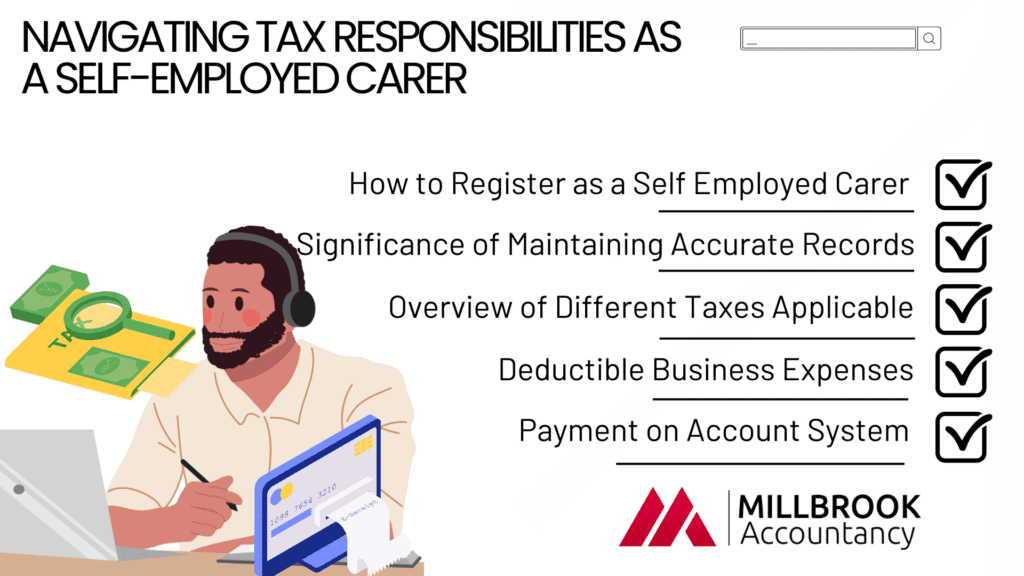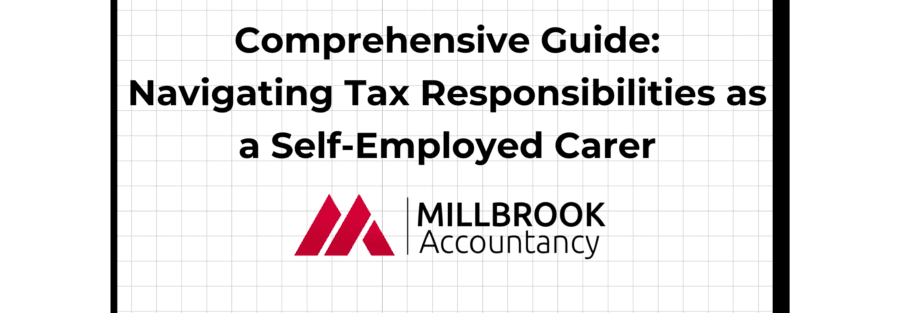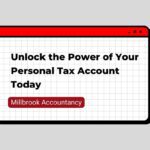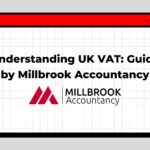Introduction of self-employed carer Tax Responsibilities
self-employed carer play a crucial role in providing essential services to those in need. However, it’s imperative for self-employed carer to comprehend and fulfill their tax obligations to ensure legal compliance and financial stability. This comprehensive guide will explore the intricacies of paying taxes as a sel-employed carer, covering essential topics such as registration, record-keeping, tax liabilities, allowable deductions, and more.


Becoming a Self-Employed Carer
Essential Qualifications and Skills
While there are no specific legal requirements, obtaining recognized care industry qualifications, such as the Care Certificate, can enhance your credibility. Pursuing diplomas, NVQs, or gaining experience through apprenticeships adds value to your skills as a self-employed carer.
Access to Relevant Training and Certifications
Consider web-based resources, networking, local care organizations, and in-person interactions to secure employment opportunities as a self-employed carer.
How to Register as a Self Employed Carer
To embark on your self-employed journey, registering with HM Revenue and Customs (HMRC) is a prerequisite. Ensure timely registration by visiting the HMRC website and completing the online form. Failure to register on time may lead to fines, emphasizing the significance of meeting deadlines.
Deadlines for Registration
Whether you’re already self-employed or planning to be, immediate registration is advised. Missing deadlines can result in penalties, so prompt action is essential to stay compliant.
Significance of Maintaining Accurate Records
Accurate record-keeping is vital for tax compliance. Detailed records not only prepare you for potential HMRC audits but also help in minimizing tax burdens. Key financial documents, such as customer invoices, receipts, and bank statements, must be meticulously maintained.
Embracing Technology for Record-Keeping
Explore technology tools like QuickBooks, Xero, and receipt management apps for efficient record-keeping. These tools streamline the process, ensuring financial transparency and responsibility.
Overview of Different Taxes Applicable
Understanding the various taxes applicable to self-employed carers is crucial for financial planning. Income Tax, National Insurance Contributions (NICs), and the Self-Assessment Tax Return process are essential components.
Self-Assessment Tax Return Process
A step-by-step guide to the Self-Assessment process, from registration to submission, ensures compliance and avoids penalties. Paying tax bills promptly after assessment is critical to prevent interest and penalties.
Deductible Business Expenses
Self-employed carers can maximize returns by deducting legitimate business expenses. From travel expenses to professional fees, understanding allowable deductions is key to minimizing tax liabilities.
Tax Relief Options and Deductions
Explore simplified expenses, capital allowances, pension contributions, and National Insurance contribution options to optimize tax breaks available for self-employed carers.
Payment on Account System
The Payment on Account system allows self-employed individuals to spread Income Tax and National Insurance payments across the tax year. Understanding installment due dates and convenient payment methods is crucial for effective cash flow management.
Navigating Tax Payment Deadlines
Knowing when to make payments, utilizing electronic or card payments, and understanding the consequences of errors or delays are essential aspects of the Payment on Account system.
Frequently Asked Questions
This section addresses common queries, such as determining tax obligations, the registration process, income reporting, claimable expenses, payment methods, and consequences of non-compliance.
Importance of Maintaining Accurate Records for Tax Compliance
Elaborating on the significance of maintaining accurate records for tax compliance, this section emphasizes the role of thorough documentation in minimizing tax burdens and ensuring transparency in financial transactions.
Key Financial Documents for Tax Purposes
Detailed information about the essential financial documents required for tax purposes, including customer invoices, receipts, bank statements, and other relevant paperwork, ensures self-employed carers are well-prepared for tax assessments and audits.
Embracing Technology with Software and Tools for Record-Keeping
Delving deeper into the technological aspect of record-keeping, this section provides a comprehensive overview of software and tools available for self-employed carers. It explores popular accounting software such as QuickBooks and Xero, as well as receipt management applications like Receipt Bank and Expensify.
Benefits of Embracing Technology
Highlighting the advantages of incorporating technology into record-keeping processes, this section emphasizes efficiency, accuracy, and time savings. It explores how these tools can automate tasks, streamline financial reporting, and contribute to overall financial well-being.
Overview of Different Taxes Applicable to Self-Employed Carers
Expanding on the section about taxes, this part of the article provides an in-depth exploration of Income Tax, National Insurance Contributions, and other relevant taxes. It discusses tax rates, thresholds, and the implications of each tax category for self-employed carers.
Income Tax for Self-Employed Carers
Detailed information about how Income Tax applies to self-employed carers, including tax rates, personal allowances, and considerations for calculating taxable income, provides clarity on this critical aspect of tax obligations.our qualified staf provide the best service to consult you regarding income tax for self-employed carers
National Insurance Contributions (NICs) for Self-Employed Carers
This section focuses on the specifics of National Insurance Contributions (NICs) for self-employed carers. It explains the different classes of NICs, their rates, and how contributions are calculated based on earnings.
Self-Assessment Tax Return Process: A Step-by-Step Guide
Navigating through the Self-Assessment Tax Return process, this section offers a detailed step-by-step guide. It covers the registration process, maintaining income and expense records, completing the tax return, and submitting it within the deadlines.
Importance of Accurate Reporting
Emphasizing the significance of accurate reporting in the Self-Assessment process, this section discusses how thorough record-keeping and precise reporting contribute to a smooth and compliant tax return. It highlights common pitfalls to avoid during the reporting phase.
Deductible Business Expenses for Self-Employed Carers: Maximizing Returns
Building on the earlier discussion of deductible expenses, this section provides a comprehensive list of everyday expenses that self-employed carers may be eligible to deduct. It explores categories such as travel expenses, professional fees, development and training costs, equipment and supplies, and marketing and advertising expenses.
Strategies for Maximizing Deductions
Offering practical strategies for maximizing deductions, this section advises self-employed carers on keeping thorough records, categorizing expenses correctly, and leveraging available tax relief options. It emphasizes the importance of staying informed about allowable deductions to optimize returns.
Tax Relief Options and Deductions for Self-Employed Carers: Beyond Business Costs
Expanding on various tax relief options, this section explores avenues beyond legitimate business costs. It covers simplified expenses, capital allowances, pension contributions, and National Insurance contribution options that can further enhance tax benefits for self-employed carers.
Simplified Expenses: A Viable Option
Explaining the concept of simplified expenses, this section offers insights into how self-employed carers can calculate and claim allowable costs associated with using their homes for business purposes. It provides a simplified method for home-based self-employed carers to determine deductible expenses.
Capital Allowances: Optimizing for Assets
This part of the article explores capital allowances and their relevance to self-employed carers. It explains how assets such as specialized medical equipment or technology used in the business can qualify for capital allowances, providing an additional avenue for reducing tax liabilities.
Pension Contributions: A Strategic Approach
This section outlines the benefits of contributing to a registered pension system as a self-employed carer. It emphasizes the potential impact on taxable income and encourages carers to explore this option as part of their overall financial strategy.
Payment on Account System for Self-Employed Carers: Managing Cash Flow
Expanding on the Payment on Account system, this section offers a detailed examination of how self-employed carers can manage their Income Tax and National Insurance payments throughout the tax year. It provides insights into installment due dates and methods for ensuring effective cash flow management.
Due Dates and Payment Methods
Clarifying the due dates for account payments in January and July, this section outlines the convenient ways self-employed carers can make payments. It covers electronic or telephone banking, credit or debit card payments, and the option of setting up a Direct Debit arrangement for seamless transactions.
Consequences of Payment Errors and Delays
Highlighting the potential consequences of payment errors and delays, this section emphasizes the importance of accurate and timely payments. It explores the implications of late payments, incorrect payments, and potential penalties imposed by HMRC for non-compliance.
Frequently Asked Questions: Addressing Common Queries
This section addresses common queries related to tax obligations, registration, income reporting, claimable expenses, payment methods, and consequences of non-compliance.
Importance of Maintaining Accurate Records for Tax Compliance
Elaborating on the significance of maintaining accurate records for tax compliance, this section emphasizes the role of thorough documentation in minimizing tax burdens and ensuring transparency in financial transactions.
Key Financial Documents for Tax Purposes
Detailed information about the essential financial documents required for tax purposes, including customer invoices, receipts, bank statements, and other relevant paperwork, ensures self-employed carers are well-prepared for tax assessments and audits.
Embracing Technology with Software and Tools for Record-Keeping
Delving deeper into the technological aspect of record-keeping, this section provides a comprehensive overview of software and tools available for self-employed carers. It explores popular accounting software such as QuickBooks and Xero, as well as receipt management applications like Receipt Bank and Expensify.
Benefits of Embracing Technology
Highlighting the advantages of incorporating technology into record-keeping processes, this section emphasizes efficiency, accuracy, and time savings. It explores how these tools can automate tasks, streamline financial reporting, and contribute to overall financial well-being.
Overview of Different Taxes Applicable to Self-Employed Carers
Expanding on the section about taxes, this part of the article provides an in-depth exploration of Income Tax, National Insurance Contributions,
Conclusion: Thriving as a Self-Employed Carer
In conclusion, this comprehensive guide equips self-employed carers with the knowledge and insights needed to navigate their tax responsibilities successfully. By understanding the intricacies of registration, record-keeping, allowable deductions, and tax relief options, carers can not only meet their financial obligations but also thrive in their careers.
Seeking Professional Advice
Acknowledging the complexity of tax laws and regulations, the article recommends seeking advice from qualified professionals, such as chartered accountants or tax advisers. Their expertise can provide tailored solutions and ensure compliance with ever-changing HMRC regulations.
Embracing Financial Well-Being
Encouraging self-employed carers to view financial management as an integral part of their overall well-being, the conclusion emphasizes the importance of maintaining accurate records, leveraging technology, and staying informed about tax obligations.
Contributing to Healthcare Ecosystem
Highlighting the broader impact of self-employed carers in the healthcare ecosystem, the article emphasizes how financial responsibility contributes to the overall sustainability and growth of the caregiving profession.
By adopting the insights and recommendations outlined in this guide, self-employed carers can not only fulfill their tax responsibilities effectively but also build a foundation for long-term financial success. Thriving as a self-employed carer involves a proactive approach, continuous learning, and a commitment to financial well-being in the dynamic landscape of self-employment.
If you want our consultation regarding self-employed carers services or any other specific requirments we are happy to help you.





